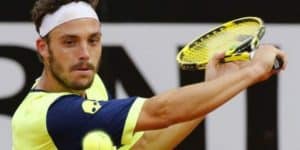
The news this week that 13 people had been arrested on charges of match fixing in lower-level professional tennis, is just the latest scandal associated with illegal betting on tennis.
Belgian authorities cooperated with Bulgarian, Dutch, French, German, Slovakian and US counterparts in mounting simultaneous raids which saw the people involved held on suspicion of match-fixing, corruption, money laundering and participation in organised criminal activities.
This comes hard on the heels of the April report from the Independent Review Panel (IRP), after an investigation into the integrity of professional tennis, which complained of a “tsunami” of corruption in the sport.
Wimbledon Tips Here | US Open Tips Here
Led by Adam Lewis QC, the IRP found a “very significant” corruption problem at “lower and middle levels of the sport” which Mr Lewis described as a “fertile breeding ground for breaches of integrity”, with the men’s game particularly vulnerable – 83% of suspicious match alerts between 2009 to 2017 were associated with men’s matches.
Tennis betting is second only to football in terms of worldwide popularity, with billions of dollars bet on the sport annually.
There is one simple reason for this – there is a tennis match being played somewhere in the world, virtually every day and in every time zone, with tournaments taking place regularly, often several at the same time.
This means there is nearly always a match on which you can bet, be if from the main women’s (WTA) or men’s (ATP) tours, or the “feeder” leagues like the Challenger and ITF Futures tours.
 In addition, tennis betting offers a wide variety of odds on which to bet, apart from the simple issue of which player will win the match. These include opportunities on Set Betting, the distribution of games in each of the sets, how many sets a match will last, whether there will be a tie break, or an even or odd number of games in a set.
In addition, tennis betting offers a wide variety of odds on which to bet, apart from the simple issue of which player will win the match. These include opportunities on Set Betting, the distribution of games in each of the sets, how many sets a match will last, whether there will be a tie break, or an even or odd number of games in a set.
However, it is when the match actually starts that the turnover really increases, with betting in-play. Punters can bet on who will win the set and even who will win the next point.
It is this live betting which really sees the big money staked on tennis. Tournaments do not even need to be televised for betting markets to be drawn up. As long as bookmakers have access to a live feed updating scores in real time, they will take bets on it.
However, when such money is at stake, the opportunities for corruption and match-fixing are just too tempting for some.
Unlike team sports, in a match involving just two players, it can be easy for one of them to decide not to try too hard without it being readily detected.
As long ago as 2007, a dossier of matches thought to have been fixed was presented to investigators, although the tennis authorities on that occasion chose to do nothing.
And then, In May 2011, Austrian Daniel Kollerer, who was ranked as high as 55 in the world at one point, was banned for life for match-fixing and was also found guilty of soliciting another player not to give their best efforts.
The evidence would appear to suggest that match-fixing tends to happen in lower-level tournaments, such as matches played on the International Tennis Federation (ITF) Futures circuit and the Association of Tennis Professionals (ATP) Challenger tour. In large part, players at this level have more incentive to cheat.
The financial rewards on offer are much less, and when the costs of travelling, equipment and paying a coach are taken into account, many of them are barely scratching a living. No wonder some are prepared to listen to the blandishments of bookmakers and intermediaries and agree to fix matches, or elements of them.
However, in the run up to Australian Open in 2016, the Tennis Integrity Unit (TIU) chose to stay silent over information that 16 players, including Grand Slam winners had been involved in fixing matches, including at Wimbledon.
And then there is the case of surprise French Open semi-finalist Marco Cecchinato, who, despite his glorious run at Roland Garros, continues to be dogged by the events of 2016 when he was suspended for 18 months by the Italian tennis federation having been accused of fixing.
Although the ban was later overturn, and Cecchinato has always denied the allegations, he resolutely refuses to discuss it, saying “I don’t want to speak about that”.
Whilst the April report insisted there was no evidence of a cover-up by governing bodies, this is a matter that tennis authorities need to take very seriously. The integrity of any sport depends on players trying their utmost, to the limit of their skill, talent, fitness and character to win.
Moreover, it relies on the belief that those who are watching a match have that the players involved are “clean” and that the result, or part of the result, is not fixed in any way. Once that belief is eroded, there is no way back, and fans, TV viewers and sponsors alike will walk away.
Be the first to comment